
OverviewAbout this course
Immerse yourself in the equine breeding industry through on-the-job training and access to industry-standard facilities. Gain solid theoretical knowledge and practical experience that will enhance your career opportunities both locally and globally.
OutcomesWhat you'll gain
Learning outcomes
Through a mixture of theory and practical course work, learn to:
Approach and handle horses safely
Understand horse behaviour
Assist with serving and foaling down mares
Conduct health assessments on horses
Maintain and provide for the healthcare, welfare and nutrition of horses
Course outcomes
Gain practical experience and develop specialist skills that give you an advantage in the job market.
A nationally accredited qualification at a Certificate III level
Skills in horse breeding such as caring for broodmares and foals
Exposure to the day-to-day operations of a horse breeding facility
Experience working in actual stud facilities or horse breeding operations
Strong pathways to continue your studies and enhance your career opportunities both locally and globally
SuitabilityIs this course right for you?
Entry requirements
This course requires evidence of previous experience or study before you can enrol
This course is offered as a traineeship. Enquire today to check the eligibility requirements.
Please check your preferred location for campus-specific entry requirements.
Completion requirements
During your study you’ll need to provide your teacher with the following evidence:
A Language, Literacy and Numeracy (LLN) skills test and achieve a score of 12 across the five bands of literacy and 2 across one band of numeracy. This skills test helps us to understand your individual study needs and to provide you with the appropriate support for your study success.
Entry recommendations
To be prepared for this course, we recommend that you have:
The ability to rise early for horse care duties and conduct night watch activities
A reasonable level of fitness to undertake manual tasks associated with the equine industry
A passion for horses and an interest in caring for pregnant and foaling mares
An interest in starting or expanding your career prospects in the equine industry
Access to a computer or similar device with internet connection
The ability to provide your own Personal Protective Equipment (PPE) during the course. These include: appropriate footwear such as safety boots, appropriate clothing such as full-length trousers and sleeved shirts, and appropriate protective clothing.
TAFE NSW is committed to meeting the learning needs of every community. Meeting these needs can mean there are additional entry requirements at different campus locations. Check your preferred location for further requirements. If you need help preparing for study, contact us to find out how we can support you.
PathwaysFuture career and study options
Career pathways
Our graduates go onto roles like: stud hand, foal watch attendant, broodmare attendant, stallion attendant and yearling attendant.
Study pathways
Take your study further with other courses offered at TAFE NSW:
Previous study0 Courses
Begin here to gain experience and confidence in this study area.
The Certificate III in Horse Breeding does not have any pre-requisite courses.
Further study2 Courses
Advance your skills to take your career to the next level
Related study3 Courses
Strengthen your expertise and gain specialist skills to expand your employability.
Your experience counts
At TAFE NSW, we recognise your previous study and work experience. You can apply for recognition of prior learning or a credit transfer with any of our courses. If you're successful you'll get your qualification faster.
UnitsUnits taught in this course
Courses are made up of a combination of both core and specialty units. In the Certificate III in Horse Breeding qualification, you’ll need to successfully complete 15 units of competency, including 3 core and 12 speciality units.
Please note, not all specialty units are offered at every TAFE NSW location. It is highly recommended that you check with your preferred campus for information about the specialty units offered at that location.
Core units are central to the job outcomes of a particular industry or occupation. These are the units industry has agreed are essential to be capable and qualified at a particular study level.
Contribute to health and safety of self and othersBSBWHS201
Follow equine biosecurity and infection control proceduresACMINF302
Work effectively in horse breeding sectorRGRHBR301
TAFE NSW servicesFacilities and support
TAFE NSW provides support services across all campus locations and online. Whatever your needs or circumstances, we have the people, resources, counselling and facilities to support you in focusing on your studies.
TAFE NSW Disability Support Service
TAFE NSW Language, Literacy and Numeracy (LLN) support
TAFE NSW Aboriginal Support; Learner support (ABE)
TAFE NSW Careers, Counselling and Pathways Service
TAFE NSW Libraries
Scholarship programs – be supported as you explore your talents and fulfil your potential
Read&Write literacy and study support software is available free for all TAFE NSW students to use while studying on campus and at home
LinkedIn Learning – an online resource which offers innovative courses and tutorials to improve your personal and professional skills
Student associations – get social with our student community